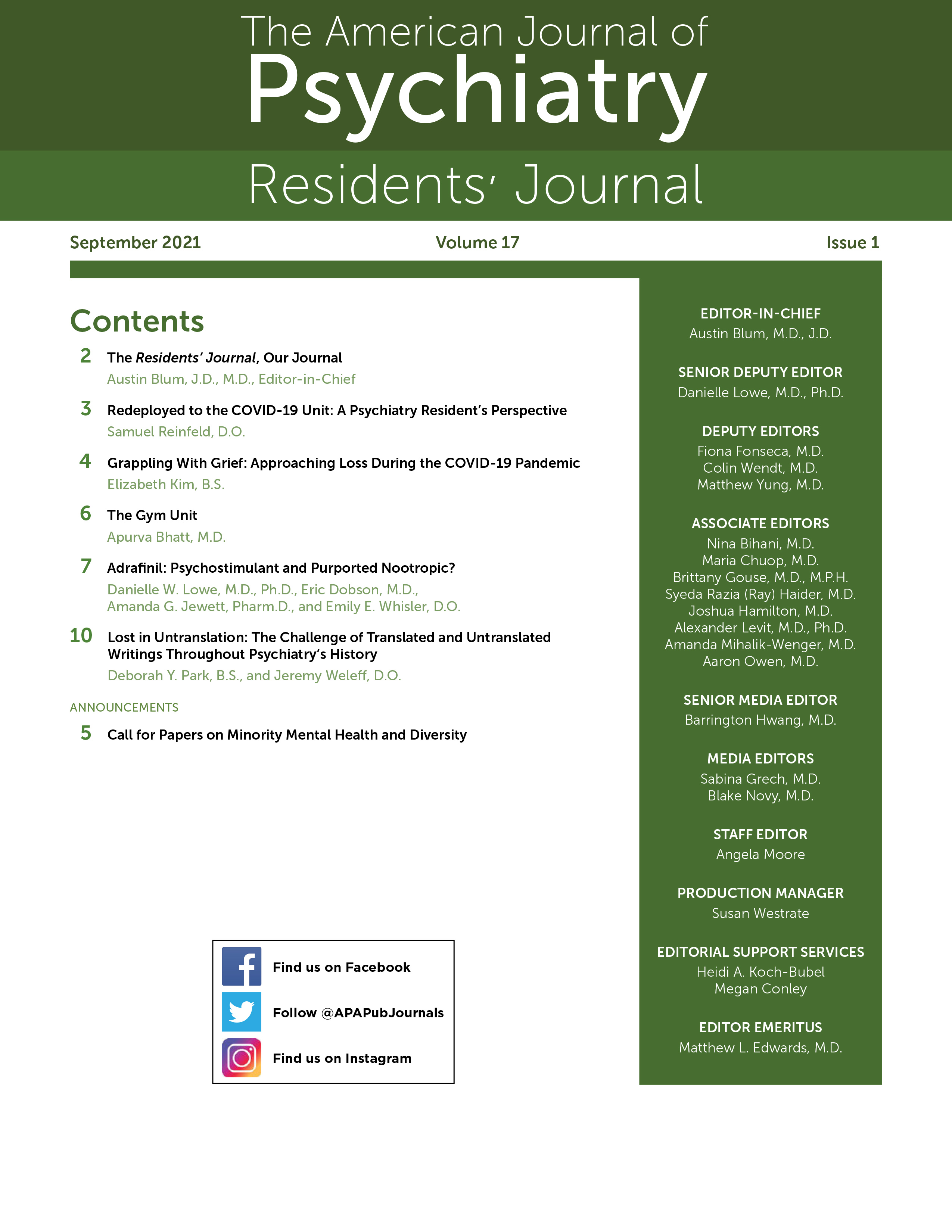Lost in Untranslation: The Challenge of Translated and Untranslated Writings Throughout Psychiatry's History
Modern psychiatric practice has historically been influenced by authors of different schools of thought, countries, and tongues. Unfortunately, the translation of psychiatric texts—if they are translated at all—is susceptible to error. As a result, psychiatrists do not have access to past perspectives that could challenge or complement current paradigms.
Translating a work into another language often fails to capture the essence of the original thoughts. For instance, scholars have discussed how the translated works of Philippe Pinel (1745–1826), who is regarded as the founder of modern evidence-based psychiatry, fail to convey the fullness of his thoughts (1). In Pinel's 1809 Medico-Philosophical Treatise on Mental Alienation, the usage of the French term délire is not identical to the English term "delusion," as délire is ambiguous between an intellectual, cognitive belief state, or "delusion," and a nonintellectual, noncognitive, disorganized affective state, or "delirium." These nuanced dissimilarities between English and French words illustrate the need for meticulous translation of French into English, to prevent distortion of the content.
Troubled by students' lack of engagement with past theories of notable figures, many authors express concern that psychiatrists in training rely too heavily on DSM for understanding psychiatric conditions. In particular, Dr. S. Nassir Ghaemi contrasts Henri Ey's (1900–1977) detailed textbook of psychiatry syndromes, which covers 1,015 pages, with the DSM's concise diagnostic criteria (2). Although length is not always an indicator of comprehensiveness, the discourse that often exists in Henri Ey's works is largely lost in more concise textbooks. His books are a personal synthesis of over 40 years of work and detail a dense framework for his ideas. Ey often describes his personal conception of psychopathological phenomena, philosophical ideas regarding a human being's consciousness and pathology, and analysis of the theories developed by his contemporaries (3). French-speaking clinicians of the past were heavily influenced by famous teachers such as Henri Ey. However, few modern psychiatrists consult Henri Ey's texts, as they remain untranslated into English and thus are largely inaccessible to non-French speakers. Other scholars have noted similar challenges regarding the accessibility of historical texts, namely, the authors of The Maudsley Reader in Phenomenological Psychiatry. The authors of this notable textbook have discussed how difficult it was to obtain original source materials, as many were untranslated (from German) or out of print (4).
This paucity of translated material is harmful, as it can delay the progress of psychiatric theories. Although our current concept of schizophrenia is heavily influenced by the ideas of Eugen Bleuler (1857–1939), many of his articles remain untranslated into English. For instance, Bleuler wrote on polygenic risk models in schizophrenia in 1917, yet we only recently gained access to this work through translation efforts (5). Consequently, few scholars (other than Kenneth Kendler in 2020 [5] and David Rosenthal in 1978 [6]) have commented on Bleuler's novel views on polygenic risk models in schizophrenia, on which current genomic investigations have shed more light.
The need for translating more works has become increasingly apparent through the examples outlined in this article. Access to past materials and ideas allows for contemporary psychiatrists to better immerse themselves in the history of psychiatric theory and practice. Without engaging in thoughtful discussions on modern paradigms and their historical roots, trainees lose the opportunity to learn from the past for future practices. Although some historical methods or ideas may be misguided or outdated, studying past errors still adds value as a reminder to avoid repeating the mistakes already made.
With the objective of training students to become clinicians who can critically assess thoughts of the past with the desire to expand and improve future psychiatric practice, accessibility to historical texts becomes crucial. Translation accuracy can be maximized by using bilingual translators and focus groups to identify concepts and terms for which semantic differences may exist. As English-speaking students engage with the material, the readability and accuracy of the translated material can be improved and updated regularly.
Trainees can use historical texts as a helpful companion to contemporary work to familiarize themselves with current and past ideas relevant to psychiatry. For instance, Bleuler's articles on schizophrenia help contextualize contemporary research on polygenic risk models in schizophrenia. Once translated, Henri Ey's works can provide a compendium of topics in the context of French psychiatric and philosophical traditions, allowing for diversified perspectives across cultural contexts regarding psychiatric conditions. Incorporation of these and additional historical materials into residency didactics would provide a rich opportunity for trainees to engage with experts and clinicians of the past in a progressive and interactive conversation about psychiatric illness, its causes, and its treatment.
1. : Lost in myth, lost in translation: Philippe Pinel's 1809 Medico-Philosophical Treatise on Mental Alienation. Int J Ment Health 2018; 47:245–249 Crossref, Google Scholar
2. : The Concepts of Psychiatry: A Pluralistic Approach to the Mind and Mental Illness. Baltimore, Johns Hopkins University Press, 2004 Google Scholar
3. : Phenomenology in Henri Ey's work and French psychiatry, in Phenomenology World-Wide. Edited by Tymieniecka AT. Dordrecht, Netherlands, Springer, 2002 Crossref, Google Scholar
4. : The Maudsley Reader in Phenomenological Psychiatry. Cambridge, United Kingdom, Cambridge University Press, 2012 Google Scholar
5. : Eugen Bleuler's views on the genetics of schizophrenia in 1917. Schizophr Bull 2020; 46:758–764 Crossref, Google Scholar
6. : Eugen Bleuler's thoughts and views about heredity in schizophrenia. Schizophr Bull 1978; 4:476–477 Crossref, Google Scholar



